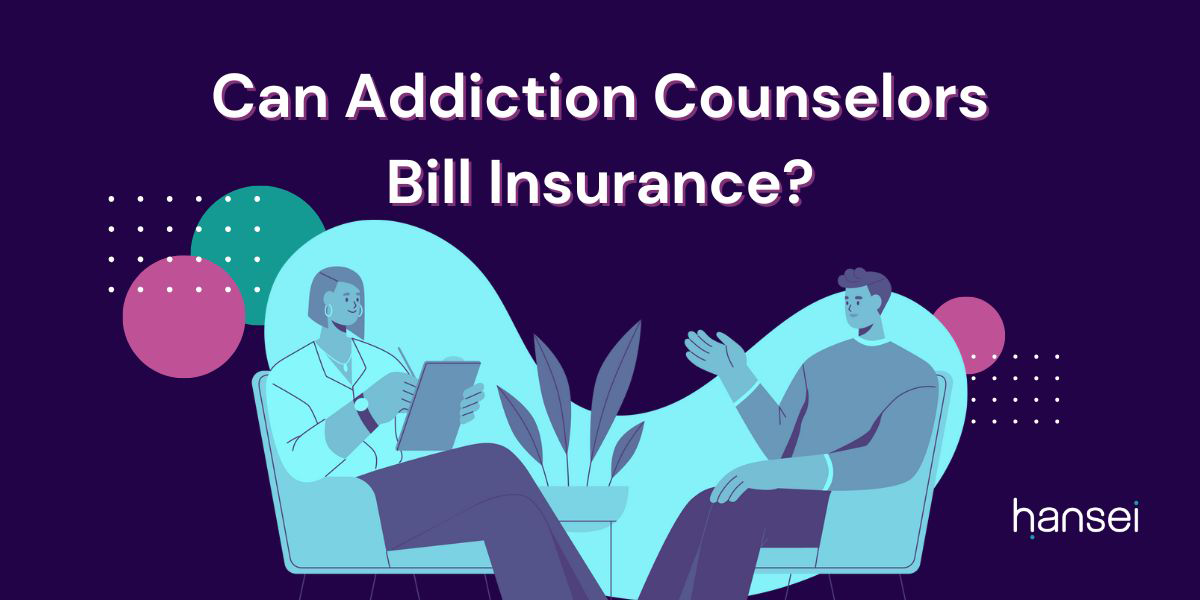Blog

Addiction counselors play a vital role in helping individuals recover from substance use disorders. But when it comes to billing insurance for their services, things can get a bit tricky. If you’re an addiction counselor or part of a treatment center wondering how to make the insurance billing process easier, you’re not alone. The ability to bill insurance depends on several factors, including your credentials, the services you provide, and the specific insurance policies involved.

What Determines If Addiction Counselors Can Bill Insurance?
The ability to bill insurance isn’t a one-size-fits-all situation. It depends on several key factors:
- Licensure: Many insurance companies only reimburse services provided by counselors with specific credentials, such as Licensed Professional Counselors (LPCs), Licensed Clinical Social Workers (LCSWs), or Certified Addiction Counselors (CACs). Checking your state’s licensing requirements and ensuring you meet all necessary qualifications is crucial.
- Services Provided: Insurance typically covers therapy sessions, group counseling, and family interventions as long as they fall within your scope of practice. However, administrative tasks or informal support services may not qualify for reimbursement. Confirming that your services align with payer policies is essential.
- Insurance Credentialing: Enrolling in insurance panels, or credentialing, is required to become an in-network provider. This process involves submitting proof of your qualifications and agreeing to the insurer’s terms. Once approved, you can bill for services directly.
Steps to Bill Insurance as an Addiction Counselor
Successfully billing insurance requires careful planning and attention to detail. Here’s how you can easily get through the process:
- Verify Your Qualifications: Review your state’s licensing board requirements and the specific policies of the insurance companies you plan to work with. Some insurers may require additional certifications or evidence-based training to approve your services.
- Start the Credentialing Process: Apply to insurance panels by submitting documents such as your license, liability insurance, and educational background. Credentialing can take several months, so it’s a good idea to start early. Once approved, you’ll receive a provider agreement outlining the reimbursement rates and terms for billing.
- Learn CPT Codes: Understand the codes used to describe the services you provide. For instance, 90832 is for a 30-minute therapy session, while 90853 is for group therapy. Familiarity with these codes ensures accurate billing and reduces the risk of claim denials.
- Get Prior Authorization: Some insurers require pre-approval before services can be reimbursed. Be prepared to provide details about the patient’s treatment plan and diagnosis during this process.
- Submit Claims Electronically: Use an electronic billing system to streamline submissions. Ensure your documentation, such as session notes and treatment plans, is complete to support your claims. Keep track of submissions and follow up promptly on any delays or denials.
Challenges Counselors Face When Billing Insurance
Let’s be honest—billing insurance isn’t always smooth sailing. One common hurdle is dealing with insurance limitations. Some plans don’t cover addiction counseling services, or they may cap the number of sessions allowed. Understanding these restrictions upfront can help you manage expectations with your clients.
Another challenge is the financial side of insurance billing. Reimbursement rates for addiction counseling services are often lower than standard fees, which can strain smaller practices. Negotiating rates during the credentialing process or offering a mix of insurance and cash-pay options can help alleviate this issue.
Claim denials are another headache many counselors encounter. Whether it’s due to incorrect coding, missing documentation, or lack of prior authorization, denials can slow down your cash flow. Staying organized and double-checking claims before submission can reduce the likelihood of these issues.

What If Insurance Isn’t an Option?
If billing insurance isn’t feasible, there are still other ways to ensure your services are accessible. Many counselors operate on a cash-pay basis, offering sliding scale fees to accommodate clients with different financial situations. Partnering with organizations that offer grants or scholarships for addiction treatment is another way to make your services more affordable.
Counselors may choose not to credential with insurance plans but still provide services that clients can submit for out-of-network reimbursements. Clients often pay at the time of service and receive a superbill (a detailed receipt) to submit to their insurer.
Additionally, consider collaborating with Employee Assistance Programs (EAPs). These programs often cover counseling services as part of workplace benefits, allowing you to provide care without dealing with traditional insurance hurdles.
Simplify Billing with Hansei Solutions
Billing insurance as an addiction counselor doesn’t have to be overwhelming. At Hansei Solutions, we specialize in helping behavioral health professionals streamline their billing processes. From credentialing to submitting claims and resolving denials, we’re here to take the burden off your shoulders.
Our team understands the unique challenges addiction counselors face and is committed to helping you maximize your reimbursements while staying compliant with regulations. Let us handle the administrative details so you can focus on what you do best—supporting your clients on their journey to recovery.
How Hansei Solutions Can Help
At Hansei Solutions, we specialize in helping addiction counselors and behavioral health providers navigate the complexities of insurance billing from credentialing to claims submission and denial resolution.
With deep expertise in behavioral health revenue cycle management, we empower providers to:
- Streamline credentialing with insurance payers
- Submit accurate claims with appropriate coding
- Manage denials and appeals efficiently
- Maximize reimbursement while remaining compliant
Ready to simplify your billing process? Contact us today and see how we can help your practice thrive.

Ready to focus on providing healthcare? Let us lighten your load.
We’re here to address your pain points and create growth opportunities for your organization. We’re passionate about what we do, and it shows in every interaction. Learn what makes us tick and schedule a demo today.